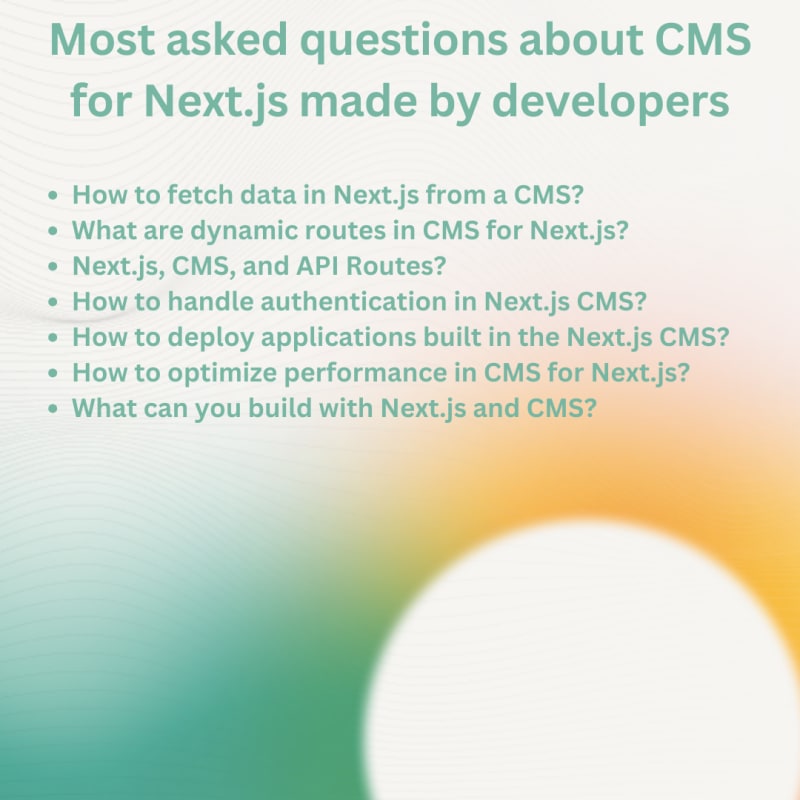People like to ask, let's give them some answers then.
I will give answers to the most googled questions when it comes to Next.js & CMS integration. To help you make an informed choice, I'll address the top 14 questions people ask when selecting a Next.js CMS.
Most-googled questions about CMS for Next.js
1. What is Next.js, and why should you use it?
Next.js is a React-based framework known for its exceptional performance, SEO capabilities, and developer-friendly features. If you're considering Next.js, you likely prioritize these aspects.
When selecting a CMS, ensure it seamlessly integrates with Next.js to leverage these advantages fully. So, the best thing to do is search for an open-source and headless CMS that can offer flexibility and support for Next.js features.
2. What type of content do you need to manage?
Before choosing a CMS, it's essential to define the types of content you'll be handling. Are you primarily dealing with text, images, videos, products, or a combination of these elements? This understanding will guide you in selecting a CMS that efficiently manages your specific content types.
3. How does CMS handle performance?
Next.js is famous for server-side rendering (SSR), contributing to fast page load speeds and website performance. To maintain these advantages, your chosen CMS must support SSR. Evaluate how well the CMS integrates with Next.js for optimal performance.
4. How easy is it to integrate with other systems?
Your project might require integration with databases, e-commerce platforms, external APIs, or other third-party services. Select an API-first CMS offering built-in integration options to streamline this process. A CMS with well-documented APIs will make integrating with external systems a smoother experience.
5. Next.js and a headless CMS, what are the advantages?
Next.js and headless CMS offer greater flexibility, scalability, and faster performance. By combining these various elements, your site's content can be managed more efficiently. With a headless CMS, content can be managed from a single source and utilized to build various online and mobile applications with NextJS. This gives you the chance to easily and conveniently manage all of your content.
6. Can CMS improve your SEO?
Since Next.js elevates SEO, you need to choose a CMS that can do the same. Opt for a CMS that offers SEO support and provides features to enhance it. The best CMS for SEO must have SEO features such as customizable page elements, editable URL settings, automated sitemap generation, etc.
7. Is CMS for Next.js secure?
Once again, an excellent choice for high-level security would be an open-source CMS. A secure CMS platform leverages its SaaS nature to manage its security with platform updates.
Another thing you need to keep in mind is that you want to choose a CMS that uses a CDN because it often provides security features like distributed DDoS attack protection, which can help mitigate large-scale cyberattacks by spreading traffic across multiple servers and filtering out malicious requests.
Most asked questions about CMS for Next.js made by developers
Developers face challenges related to Next.js and CMS when developing web applications. Here are some of the most asked questions, and I hope my answers will help you understand better how to navigate Next.js and CMS together.
1. How to fetch data in Next.js from a CMS?
Fetching data from a CMS in Next.js is a common task. To pass data to your components, use server-side rendering (SSR) and the getServerSideProps or getStaticProps functions. This way, content is available at build time or runtime, improving performance and SEO.
2. What are dynamic routes in CMS for Next.js?
Dynamic routes in Next.js allow you to create flexible, data-driven pages. For example, you can create a dynamic route for blog posts so that each post has a unique URL.
3. Next.js, CMS, and API Routes
API routes in the Next.js CMS allow you to build your API endpoints directly within your project. This approach simplifies serverless functions and data retrieval.
4. How to handle authentication in Next.js CMS?
Authentication in Next.js can be managed using various methods like third-party providers or session-based authentication. Choose a method that aligns with your project's security requirements and user experience goals.
5. How to deploy applications built in the Next.js CMS?
A Next.js app can be deployed through various hosting providers, including Vercel, Netlify, and AWS Amplify. Different hosting providers offer various deployment methods. Here's a general approach:
- For Vercel and Netlify, connect your Git repository to your hosting account. Configure deployment settings like build commands, environment variables, and routing rules.
- For AWS Amplify, create a new app and link it to your Git repository. Define build settings and deployment environments.
- For other hosting providers, you may need to follow their specific deployment procedures. Refer to their documentation for guidance.
6. How to optimize performance in CMS for Next.js?
Optimizing performance in Next.js involves techniques like code splitting, lazy loading, image optimization, and serverless deployment.
7. What can you build with Next.js and CMS?
The short and brief answer would be: Whatever you want, whatever you need.
The long and detailed answer needs a new section in this blog, so here we go: for the long answer, keep reading this article at BCMS blog, or just start building Next.js projects with BCMS Next.js code starters.





Top comments (0)